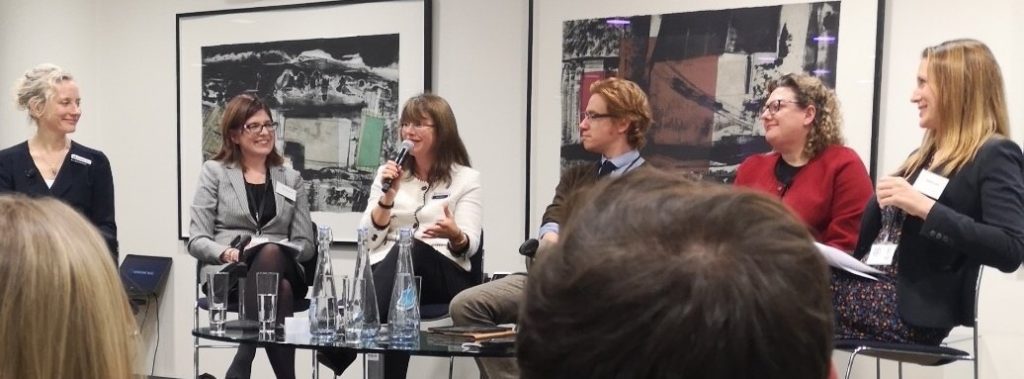Last month, the Women in IP group held their annual panel discussion and networking event. Today’s blog article has kindly been written by Meg Booth, trainee patent attorney at Appleyard Lees, and is a report from the event. Appleyard Lees is one of our Charter signatories.

© Emma Longland, Patent Attorney at HGF Ltd
After a short introduction by the co-chairs of Women in IP, Barbara Fleck (Partner at Appleyard Lees) and Joanna Conway (Of Counsel, Norton Rose Fulbright), chair Alexandra Brodie (Partner at Gowling WLG) introduced the panel. From an employment lawyer to a keen traveler, each member of the panel was able to bring their own unique insight into working flexibly. The panel included HHJ Melissa Clark (Senior Circuit Judge), Vicki McKinney (Senior Patent Attorney, Shell International LTD), Heather Lane (Partner, GJE), Anna Fletcher (Director, Gowling WLG) and Ben Hoyle (Director, Hoyle IP).
Flexible working challenges the traditional working day (i.e. 9-5, Monday to Friday) and allows employees to adopt a working lifestyle that can benefit both the employee and employer. It was clear from the discussions that various different models for flexible working exist, such as compressed hours, working part-time, flexi-time (allowing an employee to choose their own working hours within agreed ‘core hours’) and working from home. Also, the reasons for flexible working are diverse.
Ben Hoyle talked about navigating the shared parental leave (ShPL) landscape and the challenges he faced. Shared parental leave was also discussed during the Q&A session, with others providing insight into their experiences. It seemed that the implementation of the scheme varies between employers, with some asking their employees to use “keeping in touch days” on a weekly basis for the duration of the period of leave. The take home message from the discussion on ShPL was that more employees need to share their experiences in order to help others embarking on ShPL.
HHJ Melissa Clark talked about managing her career from private practice lawyer to High Court Judge, with periods of part-time working and a career break to focus on her four young children.
Anna Fletcher pointed out that any employee has the right to request flexible working hours, regardless of the reason for doing so. However, employers are not legally required to grant such requests. It was also noted that flexible working agreements result in a change to the employment contract, so that any employee wishing to revert back to the original agreement has to re-negotiate their contract. For this reason, flexible working arrangements are sometimes preceded by a trial period to ensure the agreement works, although this is no longer a legal requirement.
Various points to consider when making a flexible working request were discussed. These included treating the request for flexible working like a business proposition and thinking about the impact it could have on your team and your work. It was noted that this is of course particularly important in small teams. Panel members also discussed that a compromise between the employer and employee may sometimes be needed to arrive at a successful flexible working arrangement. In any case, when requesting flexible working, good communication with the employer is key.
It is also important to consider how your employer could benefit from the new arrangement and to demonstrate the value you can bring to the business whilst working flexibly. Heather Lane discussed how her Remote Year experience helped raising her employer’s profile. Heather visited associate firms in the countries she travelled and her travels featured as a monthly column in the CIPA journal.
There were a lot of questions from the audience, highlighting the significant interest in flexible working. One of the conclusions drawn from the discussions was that communication is one of the most important factors in making flexible working a success for both the employee and employer. Attendees were also encouraged to share their experiences more widely. It was also noted that working flexibly should not have a negative impact on career prospects and that flexible working and ambition should certainly not be viewed as mutually exclusive.
Readers are encouraged to follow @WomeninIPI to keep up to date with the latest news from the Women in IP network. You can also now book your spot at the first-of-a-kind joint event hosted by the three support groups of IP Inclusive – IP & Me, IP Out, and Women in IP. The event on Thursday 17th January at Norton Rose Fulbright, London, will explore how we can all be allies, advocates, and supporters for each other.”
Thank you Meg for providing this article. If you would like to write a blog article for IP Inclusive, on anything diversity related, please email Emily Teesdale of Abel & Imray. Guest bloggers are always very welcome!
